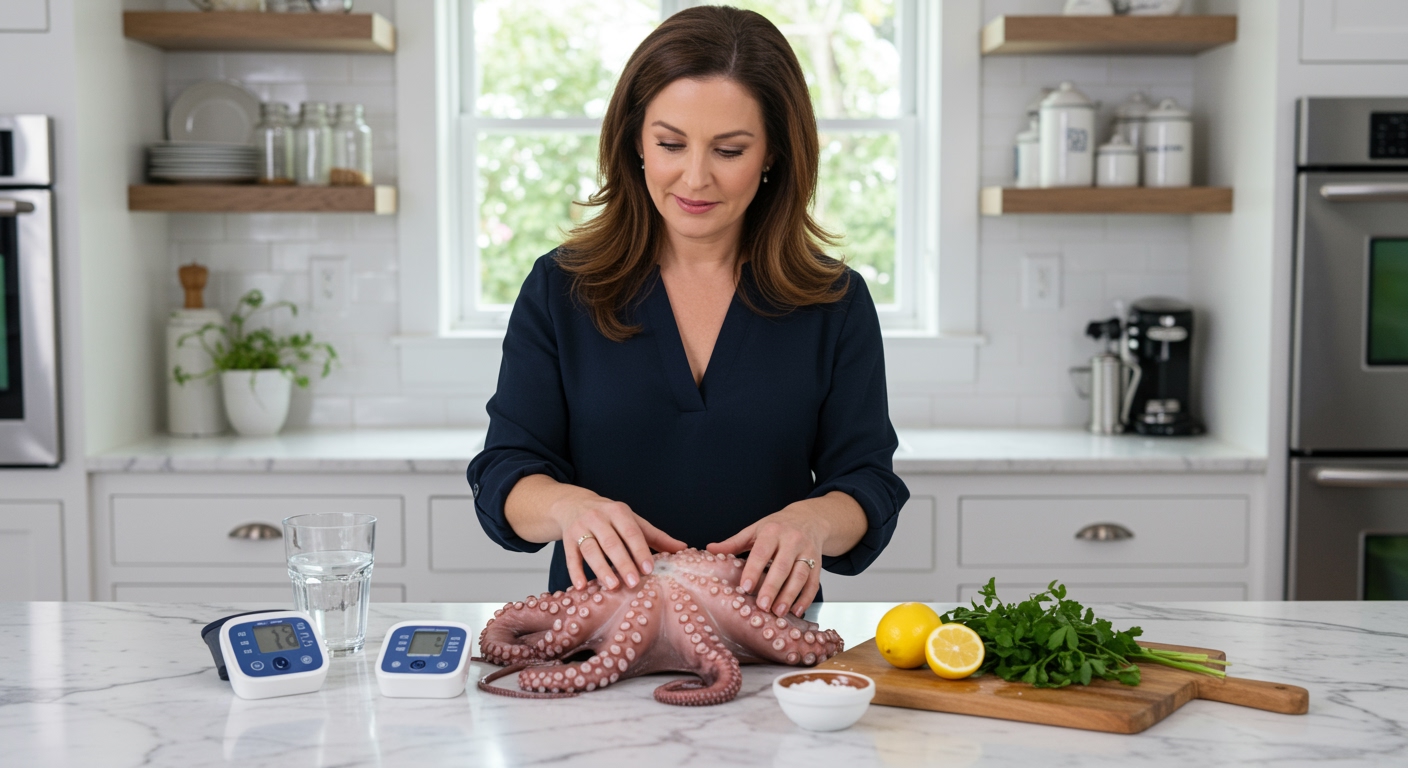✪ Key Takeaway: Octopus may help stabilize blood pressure through its high potassium content and omega-3 fatty acids.
Introduction
Your blood pressure readings have been concerning you lately, and now you are wondering if eating octopus could help.
You might be asking this question because you heard that seafood can support heart health, or perhaps someone mentioned that octopus contains special nutrients that affect blood pressure.
Hi, I am Abdur, your nutrition coach, and today I am going to explain how octopus affects blood pressure and whether this unique seafood deserves a place in your heart-healthy diet.
What Makes Octopus Special for Blood Pressure?
Octopus stands out among seafood options because of its impressive potassium content.
A 100-gram serving of octopus provides approximately 350 milligrams of potassium, which is about 10% of your daily needs.
Potassium works as a natural blood pressure regulator by helping your kidneys remove excess sodium from your body.
When sodium levels drop, your blood vessels can relax, which reduces the pressure on your arterial walls.
Octopus also contains omega-3 fatty acids, specifically EPA and DHA, which support cardiovascular health through anti-inflammatory mechanisms.
These healthy fats help maintain flexible blood vessel walls and support proper blood flow throughout your circulatory system.
✪ Fact: Octopus contains more potassium per serving than many commonly recommended heart-healthy foods like bananas.
How Does Octopus Compare to Other Seafood?
When comparing octopus to other seafood options, the nutrient density becomes quite impressive.
Octopus provides 25 grams of protein per 100-gram serving while remaining extremely low in saturated fat.
This protein content supports muscle health and helps maintain stable blood sugar levels, which indirectly benefits blood pressure control.
Unlike fatty fish such as salmon or mackerel, octopus contains minimal calories while delivering substantial amounts of essential minerals.
The magnesium content in octopus also deserves attention, as this mineral helps blood vessels relax and supports proper heart rhythm.
Many people overlook the importance of magnesium for blood pressure, but research shows that adequate magnesium intake can help prevent hypertension.
Octopus provides about 30 milligrams of magnesium per serving, contributing to your daily mineral needs without excess calories or unhealthy fats.
✪ Pro Tip: Combine octopus with potassium-rich vegetables like spinach or tomatoes to maximize blood pressure benefits.
What Are the Potential Concerns?
Despite its nutritional benefits, octopus does come with some considerations for blood pressure management.
The sodium content in octopus can vary significantly depending on preparation methods and whether it comes from saltwater or has been processed.
Fresh octopus naturally contains about 230 milligrams of sodium per 100-gram serving, which is moderate but not insignificant.
If you purchase pre-cooked or canned octopus, the sodium content can increase dramatically due to added salt during processing.
Another concern involves the cholesterol content, as octopus contains approximately 95 milligrams per serving.
While dietary cholesterol has less impact on blood cholesterol than previously thought, people with existing cardiovascular conditions should monitor their intake.
The preparation method significantly affects how octopus impacts your blood pressure, so grilling or steaming works better than frying or adding high-sodium sauces.
✪ Note: Always rinse canned or processed octopus under cold water to remove excess sodium before cooking.
How Should You Include Octopus in Your Diet?
Including octopus in a blood pressure-friendly diet requires strategic planning and proper preparation techniques.
Start with small portions of 3-4 ounces per serving, which provides substantial nutrients without overwhelming your sodium intake for the day.
Fresh or frozen octopus offers the best nutritional profile, as you control the sodium content during cooking.
Pair octopus with potassium-rich foods like leafy greens, tomatoes, or avocado to enhance the blood pressure benefits.
Cooking methods matter significantly for maximizing health benefits while minimizing harmful compounds.
Steaming, grilling, or poaching octopus preserves nutrients better than high-heat frying, which can create inflammatory compounds.
Season with herbs and spices instead of salt to add flavor without increasing sodium intake, and consider Mediterranean-style preparations with olive oil and lemon.
✪ Pro Tip: Marinate octopus in lemon juice and herbs for 30 minutes before cooking to enhance flavor without adding sodium.
The Bottom Line
Octopus can be a valuable addition to a blood pressure-friendly diet when prepared properly and consumed in appropriate portions.
The best foods for your health are those you prepare with intention and understanding, and octopus fits this philosophy perfectly when you focus on fresh ingredients and simple cooking methods.
I would love to hear about your experiences with octopus or any questions you might have about incorporating seafood into your blood pressure management plan, so please share your thoughts in the comments below.
References
At NutritionCrown, we use quality and credible sources to ensure our content is accurate and trustworthy. Below are the sources referenced in creating this article:
- Healthline: Is Octopus Healthy
- WebMD: Health Benefits of Octopus
- PMC: Nutritional and Health Benefits of Octopus
- Nutrivore: Octopus Nutrients





